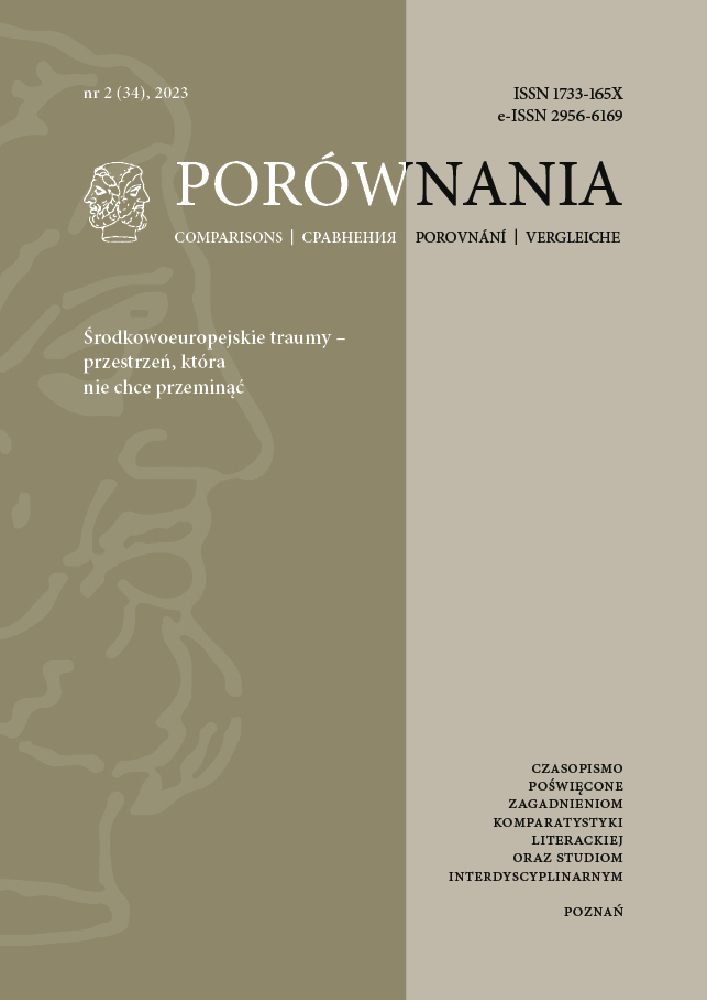Abstract
The article is a review of the recently published by Routledge anthology Olga Tokarczuk. Comparative Perspectives, edited by Lidia Wisniewska and Jakub Lipski. As the first alngo-language monograph on Tokarczuk, supported by a concrete methodological proposal, it finds a significant place in the international discourse of the author. In the Polish literary discourse, which has been divided, it also opens new interpretative paths. The authors of the anthology, passing the boundaries of traditional comparative literature, highlight the epistemological aspect of Tokarczuk’s work, the way of understanding the “bizarness”, as well as the sources of her aesthetics. It turns out that the social dimension of Tokarczuk's prose, also gains a personal character, and the tender narrator, moving along the comparative path, has a chance to break out of abstraction towards subjectivity.
References
Bendrat Anna. 2020. Socratic Dialogues on a Complex Body-Soul Relation in Plato’s Phaedo and Olga Tokarczuk’s Flights, “452°F Journal of Literary Theory and Comparative Literature”, V. 23, pp. 191-211. DOI: https://doi.org/10.1344/452f.2020.23.10
Charles Ron. 2022. Olga Tokarczuk's 'The Books of Jacob' is finally here. Now we know why the Nobel judges were so awestruck, “The Washington Post” February 1. 2022. https://www.washingtonpost.com/books/2022/02/01/olga-tokarczuk-books-of-jacob-review. Accessed 23 June 2023.
Gumbrech Hans Ulrich. 2013. After 1945: Latency as Origin of the Present, Stanford, Stanford University Press.
Jarzyńska Karina. 2023. Tender Transgressions: Olga Tokarczuk’s Exercises in Postsecular Imagination, “Critique: Studies in Contemporary Fiction”, pp. 1-14. Open Access: https://www.tandfonline.com/doi/full/10.1080/00111619.2023.2196390. Accessed 23 June 2023. DOI: https://doi.org/10.1080/00111619.2023.2196390
Kantner Katarzyna. 2019. Jak działać za pomocą słów? Proza Olgi Tokarczuk jako dyskurs krytyczny, Kraków: Universitas.
Kołodziejczyk Dorota. 2022. The Landscape of Hate – Olga Tokarczuk in Populist Discourse in Poland, “European Review”, V. 30, no. 4, pp. 545-555. DOI: https://doi.org/10.1017/S1062798722000126
Koronkiewicz Marta, Kaczmarski Paweł. 2023. Between the Mythical and the Modern: Polishness in the Work of Olga Tokarczuk and Dorota Masłowska, in: Polish Literature as World Literature, Piotr Florczyk, K. A. Wisniewski (eds.), New York, Bloomsbury Academic, pp. 177-192. DOI: https://doi.org/10.5040/9781501387135.ch-012
La Torre Lagares Elidio. 2020. Hyperglossia in Olga Tokarczuk’s Flights, “HyperCultura”, no. 9, pp. 1-12.
Michna Natalia Anna. 2023. From the Feminist Ethic of Care to Tender Attunement: Olga Tokarczuk’s Tenderness as a New Ethical and Aesthetic Imperative, “Arts”, no. 12(3), 91. Open Access: https://www.mdpi.com/2076-0752/12/3/91. Accessed 23 June 2023. DOI: https://doi.org/10.3390/arts12030091
Mortensen Ellen. 2021. The Fury’s Revenge: An Ecofeminist Reading of Olga Tokarczuk’s Drive Your Plow Over the Bones of the Dead, “Scando-Slavica”, V. 67, pp. 227-246. DOI: https://doi.org/10.1080/00806765.2021.1994002
Muskat-Tabakowska Ewa. 2020. Tenderness: General commitments of literary translation, Herald of Kyiv National Linguistic University. Series in Philology, no. 23(1), pp. 2-48. DOI: https://doi.org/10.32589/2311-0821.1.2020.207245
Nycz Ryszard. 1994. Tropy „ja”: koncepcje podmiotowości w literaturze polskiej ostatniego stulecia, „Teksty Drugie”, nr 2, pp. 7-27.
Rabizo-Birek Magdalena, Pocałuń-Dydycz Magdalena, Bienias Adam (eds.). 2013. Światy Olgi Tokarczuk: studia i szkice, Rzeszów, Wydawnictwo Uniwersytetu Rzeszowskiego.
Remak Henry H. H.. 1961. Comparative Literature. Its Definition and Function, in: Comparative Literature: Method and Perspective, Newton P. Stalknecht and Horst Frenz (eds.), Southern Illinois Unversity Press, pp. 3-19.
Tokarczuk Olga. 2019. Nobel Lecture by Olga Tokarczuk: The Tender Narrator, trans. Jennifer Croft and Antonia Lloyd-Jones, https://www.nobelprize.org/uploads/2019/12/tokarczuk-lecture-english-2.pdf. Accessed 23 June 2023.
Tokarczuk Olga. 2020. Czuły narrator, Wydawnictwo Literackie, Cracow.
Uniłowski Krzysztof. 2006. Granice nowoczesności: Proza polska i wyczerpanie modernizmu, Katowice: Wydawnictwo Uniwersytetu Śląskiego.
Wampuszyc Ewa V. 2014. Magical Realism in Olga Tokarczuk’s Primeval and Other Times and House of Day, House of Night, “East European Politics and Societies”, V. 28, no. 2, pp. 366-385. DOI: https://doi.org/10.1177/0888325413519471
Werner Konrad. 2020. Tension Between Embodied Structures and the Pursuit of Change: Exploring the Metaphysical Underpinnings of Olga Tokarczuk’s Flights, “Critique: Studies in Contemporary Fiction”, https://www.tandfonline.com/doi/full/10.1080/00111619.2023.2213823. Accessed 23 June 2023. DOI: https://doi.org/10.1080/00111619.2023.2213823
Wiśniewska Lidia, Lipski Jakub (eds.). 2023. Olga Tokarczuk. Comparative perspectives, Routledge, New York and London. DOI: https://doi.org/10.4324/9781003369455
Wiśniewska Lidia. 2009. Między bogiem a naturą. Komparatystyka jako filozofia kultury, Bydgoszcz, Wydawnictwo Uniwersytetu Kazimierza Wielkiego.
License
Copyright (c) 2023 Izabela Sobczak

This work is licensed under a Creative Commons Attribution-NoDerivatives 4.0 International License.
Utwory opublikowane w czasopiśmie „Porównania”, na platformie Pressto należącej do Uniwersytetu im. Adama Mickiewicza w Poznaniu są udostępniane na licencji Creative Commons Uznanie autorstwa - Bez utworów zależnych 4.0 Międzynarodowe (CC BY-ND 4.0)
Tym samym wszyscy zainteresowani są uprawnieni do korzystania z utworów opublikowanych pod następującymi warunkami:
-
uznania autorstwa — czyli obowiązek podania wraz z rozpowszechnianym utworem informacji o autorstwie, tytule, źródle (odnośniki do oryginalnego utworu, doi) oraz samej licencji
-
bez utworów zależnych — remiksując, przetwarzając lub tworząc na podstawie utworu, nie wolno rozpowszechniać zmodyfikowanych treści.
-
brak dodatkowych ograniczeń — nie można korzystać ze środków prawnych lub technologicznych, które ograniczają innych w korzystaniu z utworu na warunkach określonych w licencji.
Uniwersytet im. Adama Mickiewicza w Poznaniu zachowuje prawo do czasopisma jako całości (układ, forma graficzna, tytuł, projekt okładki, logo itp.).
Autor zachowuje prawa majątkowe, ale udziela zgody Uniwersytetowi im. Adama Mickiewicza w Poznaniu na wykorzystanie dzieła. Autorzy tekstów zakwalifikowanych do publikacji proszeni są o wypełnienie podpisanie i przesłanie umowa (PL) agreement (EN)
Agreement for granting a royalty-free license to works with a commitment to grant a CC sub-license





